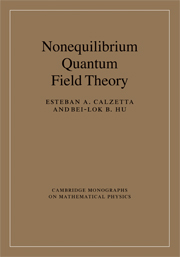Book contents
- Frontmatter
- Contents
- Preface
- I FUNDAMENTALS OF NONEQUILIBRIUM STATISTICAL MECHANICS
- II BASICS OF NONEQUILIBRIUM QUANTUM FIELD THEORY
- III GAUGE INVARIANCE, DISSIPATION, ENTROPY, NOISE AND DECOHERENCE
- IV THERMAL, KINETIC AND HYDRODYNAMIC REGIMES
- 10 Thermal field and linear response theory
- 11 Quantum kinetic field theory
- 12 Hydrodynamics and thermalization
- V APPLICATIONS TO SELECTED CURRENT RESEARCH
- References
- Index
11 - Quantum kinetic field theory
from IV - THERMAL, KINETIC AND HYDRODYNAMIC REGIMES
- Frontmatter
- Contents
- Preface
- I FUNDAMENTALS OF NONEQUILIBRIUM STATISTICAL MECHANICS
- II BASICS OF NONEQUILIBRIUM QUANTUM FIELD THEORY
- III GAUGE INVARIANCE, DISSIPATION, ENTROPY, NOISE AND DECOHERENCE
- IV THERMAL, KINETIC AND HYDRODYNAMIC REGIMES
- 10 Thermal field and linear response theory
- 11 Quantum kinetic field theory
- 12 Hydrodynamics and thermalization
- V APPLICATIONS TO SELECTED CURRENT RESEARCH
- References
- Index
Summary
The Kadanoff–Baym equations
Quantum kinetic field theory is the theme of this chapter. In this section we get right to the heart of it by showing a derivation of the celebrated Kadanoff-Baym (KB) equations [KadBay62]. The basic idea is that close to equilibrium, propagators are nearly translation invariant. It is possible to define a partial Fourier transform with respect to the relative position of the arguments. The Kadanoff – Baym equations then determine how the partial Fourier transform depends on the average (or “center of mass”) of the arguments in the original propagators.
Besides the presentation in Kadanoff and Baym's textbook, there are several derivations of these equations in the literature [Dub67, Dan84a, MroDan90, MroHei94, ZhuHei98]. We shall follow [CalHu88, CaHuRa00]. See also [Hen95, IvKnVo00, KnIvVo01, Nie02, Koi02]. References [BoVeWa00, WBVS00] follow a different path towards quantum kinetic theory, based on the so-called dynamical renormalization group.
The model.
To better appreciate the main points in this derivation, we shall consider a simple model, namely, the KB equations for the theory of a single real self-interacting λΦ4 scalar field, in the absence of background fields. Actually, the key ideas are not sensitive to the particular models, but for concreteness it will be helpful to have a model in mind. The classical action is given by equation (6.106).
A translation-invariant propagator Gab depends on its arguments x and x′ only through the so-called “relative” variable u = x − x′.
Information
- Type
- Chapter
- Information
- Nonequilibrium Quantum Field Theory , pp. 315 - 344Publisher: Cambridge University PressPrint publication year: 2008
